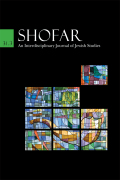
Shofar-An Interdisciplinary Journal of Jewish Studies
Scope & Guideline
Cultivating Knowledge at the Intersection of Cultures
Introduction
Aims and Scopes
- Interdisciplinary Approaches to Jewish Studies:
The journal encourages methodologies that integrate perspectives from history, literature, sociology, theology, and cultural studies to provide a comprehensive understanding of Jewish experiences. - Critical Examination of Jewish Identity:
Papers often focus on the complexities of Jewish identity, including discussions on race, gender, and religious affiliations, reflecting the diverse narratives within the Jewish community. - Historical Contextualization:
Research frequently contextualizes Jewish experiences within broader historical frameworks, such as the Holocaust, Zionism, and diasporic movements, to highlight the interplay between past and present. - Cultural and Literary Analysis:
The journal emphasizes the analysis of Jewish literature, art, and cultural expressions, showcasing how these mediums reflect and shape Jewish thought and identity. - Political and Ethical Discourse:
Contributions often engage with contemporary political issues affecting Jewish communities globally, including debates on Zionism, anti-Semitism, and social justice, fostering critical dialogue.
Trending and Emerging
- Intersectionality and Diversity in Jewish Identity:
There is a growing focus on the intersectionality of Jewish identity, exploring how race, ethnicity, gender, and sexuality interact within Jewish contexts, which signifies a move towards more inclusive scholarship. - Critiques of Zionism and Post-Zionism:
An increasing number of papers critically engage with Zionism and present post-Zionist perspectives, reflecting contemporary debates within and outside the Jewish community regarding identity and statehood. - Holocaust Studies and Memory:
Research on Holocaust memory continues to be prominent, but with a shift towards exploring its implications in contemporary discourse, including issues of representation and collective memory. - Cultural Production and Representation:
Emerging themes include the analysis of cultural production, such as literature, film, and art, examining how these forms reflect and challenge Jewish identities and experiences in modern contexts. - Social Justice and Activism:
Papers increasingly address social justice issues within Jewish communities, linking historical narratives to contemporary movements, such as anti-racism and feminism, highlighting a commitment to activism and ethical discourse.
Declining or Waning
- Traditional Religious Studies:
There is a noticeable decrease in papers focused solely on traditional religious practices and theological discussions, as the journal increasingly prioritizes contemporary cultural and political analyses. - Historical Narratives of Jewish Victimhood:
While historical studies remain important, there is less emphasis on singular narratives of victimhood, with a shift towards more complex, multifaceted portrayals of Jewish resilience and agency. - Ethnic and Nationalist Perspectives:
Themes centered on ethnic nationalism, particularly in relation to Zionism, are becoming less frequent as the journal embraces more critical and diverse perspectives on Jewish identity. - Focus on Historical Events without Contemporary Relevance:
Papers that recount historical events without linking them to current issues or debates are appearing less often, reflecting a trend towards relevance in contemporary discussions. - Gender Studies in Historical Context:
Although gender studies remain significant, there seems to be a decline in papers that exclusively focus on historical gender roles within Jewish communities, as the journal seeks to integrate gender into broader sociopolitical discourses.
Similar Journals
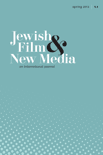
Jewish Film & New Media-An International Journal
Bridging Cultures: A Scholarly Journey Through Jewish CinemaJewish Film & New Media: An International Journal, published by Wayne State University Press, serves as a crucial platform for scholars and practitioners within the realms of Film Studies, Jewish Studies, and Media Studies. Since its inception, the journal has explored the intersection between Jewish culture and cinematic representation while also addressing contemporary media narratives. With an ISSN of 2169-0324 and E-ISSN 2169-0332, it is indexed in major databases, showcasing solid rankings in various disciplines, including a commendable Q2 rank in Visual Arts and Performing Arts. Despite its current Q4 categorizations in Anthropology and Communication, the journal is noted for its engaging contributions that sow rich discussions about Jewish identity, filmic expression, and media representation. Researchers and students alike benefit from the journal’s wealth of interdisciplinary scholarship, which spans converged years from 2013 to 2017 and 2019 to 2022, ensuring a robust timeline of critical inquiry. As an essential resource for understanding the nuances of Jewish film and new media, this journal occupies a unique niche, inviting contributions that push the boundaries of current academic dialogue.

Tradition-A Journal of Orthodox Jewish Thought
Nurturing the Legacy of Jewish IntellectualismTradition: A Journal of Orthodox Jewish Thought is a prestigious academic journal published by the Rabbinical Council of America, dedicated to the exploration and analysis of Orthodox Jewish thought and its implications on contemporary issues. With a legacy dating back to 1973, this journal serves as a crucial platform for scholars, theologians, and students interested in the rich tapestry of Jewish philosophy, law, and ethics. Although it does not offer open access, its thoughtful, peer-reviewed articles are essential for advancing knowledge in Jewish academia and fostering dialogue within the broader cultural context. As an authoritative voice in the field, Tradition invites submissions that challenge, inform, and inspire further inquiry into the complexities of Jewish tradition, ensuring that it remains at the forefront of scholarly discussion.
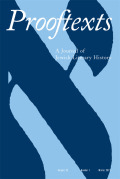
PROOFTEXTS-A JOURNAL OF JEWISH LITERARY HISTORY
Connecting Scholars Through Jewish Literary InsightsPROOFTEXTS: A Journal of Jewish Literary History, published by Indiana University Press, is a premier academic journal dedicated to the exploration and critical analysis of Jewish literature and its historical contexts. With an ISSN of 0272-9601 and an E-ISSN of 1086-3311, this journal not only serves as a platform for innovative scholarship but also aims to foster dialogue among scholars in the fields of Cultural Studies, Literature and Literary Theory, and Religious Studies. As evidenced by its 2023 Scopus ranking—place within the third quartile in Cultural Studies and Religious Studies, and second quartile in Literature and Literary Theory—PROOFTEXTS stands out as a significant contributor to academic literature, attracting a diverse readership of researchers, professionals, and students alike. The journal’s commitment to open access is limited, thus ensuring a selective dissemination of high-quality research materials. Researchers are encouraged to contribute their insights and engage with the intricate narratives that shape Jewish literary heritage from 2002 to its convergence during select years, highlighting the ongoing evolution and relevance of this vibrant field. For in-depth understanding of Jewish literary history, PROOFTEXTS remains an indispensable resource.
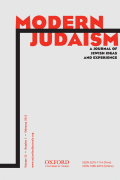
MODERN JUDAISM
Illuminating the Intersection of History and ModernityMODERN JUDAISM is a premier journal dedicated to the multifaceted exploration of Jewish culture, history, and religious practice, providing a significant platform for scholarly discourse since its inception in 1981. Published by Oxford University Press Inc in the United States, this journal stands out with its diverse engagement across disciplines, reflected in its commendable 2023 category quartiles: Q2 in Cultural Studies and History, Q1 in Religious Studies, and notable rankings in Political Science and Sociology. With an impact factor that underscores its rigorous peer-review process and scholarly relevance, MODERN JUDAISM serves as an essential resource for researchers, professionals, and students alike, fostering an academic environment conducive to innovative ideas and comprehensive studies. Although not open access, the journal remains crucial for anyone looking to deepen their understanding of contemporary Jewish thought and its intersection with broader cultural and political currents. For further inquiry or submissions, please refer to the Journals Department at 2001 Evans Rd, Cary, NC 27513.
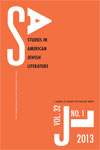
Studies in American Jewish Literature
Exploring the Rich Tapestry of Jewish Literary ExpressionStudies in American Jewish Literature, published by Penn State University Press, is a premier academic journal that delves into the rich tapestry of Jewish literary expression in America. With an ISSN of 0271-9274 and an E-ISSN of 1948-5077, this journal serves a vital role in the fields of Literature and Literary Theory, Cultural Studies, and Anthropology, as evidenced by its placement in the Q1 to Q3 quartiles across various categories in 2023. The journal is a key platform for researchers, professionals, and students interested in exploring the intersection of Jewish identity and American literature, contributing to a deeper understanding of cultural narratives and societal impacts. The publisher's commitment to scholarly excellence ensures that each issue is meticulously curated, showcasing innovative research and critical analysis. While not open access, the journal provides essential insights for anyone engaged in the study of Jewish literature or the broader cultural dynamics at play in American society. Stay informed on contemporary themes and historical contexts that shape literary discourse through this commendable publication.
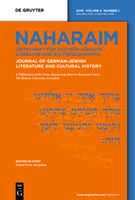
Naharaim
Advancing Interdisciplinary Insights into Near Eastern CulturesNaharaim is a distinguished academic journal dedicated to fostering interdisciplinary scholarship in the field of Near Eastern studies. Published by Walter de Gruyter GmbH, this journal aims to provide a platform for innovative research that explores the rich historical, cultural, and social dynamics of the region. With an ISSN of 1862-9148 and an E-ISSN of 1862-9156, Naharaim adheres to high academic standards, although it does not currently offer open access options. The journal aspires to engage a global audience of researchers, professionals, and students eager to contribute to and gain insights from the evolving discourse surrounding Near Eastern cultures and histories. Through rigorous peer-reviewed articles, Naharaim plays a vital role in advancing knowledge and understanding in a field of study that is increasingly relevant in today’s interconnected world.

Images
Bridging Disciplines in Cultural and Visual StudiesImages, published by BRILL, serves as a significant academic platform within the realms of Cultural Studies, History, Religious Studies, and the Visual Arts and Performing Arts. With its ISSN 1871-7993 and E-ISSN 1871-8000, this journal is committed to providing a scholarly forum that engages with the complexities of visual representations and their impact on cultural narratives. Though it currently holds a Q4 category ranking across various fields, indicating room for growth, its presence in Scopus rankings showcases its contribution to the arts and humanities, positioning it as a unique voice in interdisciplinary discourse. The journal aims to publish innovative research that fosters dialogue among scholars, practitioners, and students interested in the intersections of visual culture and societal dynamics. Despite its non-open access status, Images remains a vital resource for those seeking to understand the intricate fabric of cultural expressions from historical and contemporary perspectives, offering insights that resonate across academic and artistic landscapes.

European Journal of Jewish Studies
Unveiling New Perspectives on Jewish Heritage and ScholarshipEuropean Journal of Jewish Studies is a distinguished academic publication that offers a comprehensive platform for scholarly inquiry into Jewish studies, addressing critical intersections with cultural studies, history, literature, and religious studies. Published by BRILL, a leading academic publisher based in the Netherlands, this journal boasts a robust reputation supported by its impressive rankings and quartile classifications—Q3 in Cultural Studies, Q3 in History, Q2 in Literature and Literary Theory, and Q3 in Religious Studies as of 2023. With its convergence years spanning from 2007 to 2024, the journal serves as a vital repository of research that navigates the complexities of Jewish identity and culture through interdisciplinary lenses. Although it does not operate under an open access model, the journal's rigorous peer-review process ensures the publication of high-quality research essential for students, professionals, and academics alike. Engaging with this journal opens up pathways for critical dialogue and innovative contributions to the field, making it an essential resource for those invested in the rich tapestry of Jewish studies.
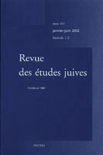
REVUE DES ETUDES JUIVES
Unveiling Insights in Jewish Studies Across Diverse FieldsREVUE DES ETUDES JUIVES, published by PEETERS, stands as a vital platform for scholarly discourse in the realms of Cultural Studies, History, Literature and Literary Theory, and Religious Studies. Based in Belgium, this journal, bearing the ISSN 0484-8616 and E-ISSN 1783-175X, has been faithfully chronicling research since its inception, with comprehensive coverage spanning from 1967, 1969, and several periods thereafter until 2023. Although categorized in Q4 quartiles across its fields—showing a diverse yet niche presence—it provides an invaluable space for emerging voices and established scholars to explore Jewish studies in a multidisciplinary context. Despite its compact impact factor and Scopus rankings reflecting its emerging status in the academic community, the journal is committed to fostering dialogue on the cultural and historical aspects of Jewish identity, offering a unique opportunity for researchers, professionals, and students to engage with contemporary and historical issues of Jewish significance. As a non-open access resource, it appeals to those seeking rigorous academic inquiry supported by Peeters' esteemed publishing acumen.
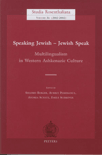
STUDIA ROSENTHALIANA
Advancing Scholarship in Rosenthaliana StudiesSTUDIA ROSENTHALIANA is a distinguished journal published by Amsterdam University Press, specializing in the interdisciplinary study of Jewish culture and history, particularly as it relates to the field of Rosenthaliana, encompassing literature, art, and historical scholarship. With a robust academic legacy dating back to its inception in 1970, the journal has evolved through various publication phases, maintaining a commitment to fostering scholarly discourse and disseminating significant research. Although it does not currently participate in an open access model, STUDIA ROSENTHALIANA continues to contribute invaluable insights to the fields of Jewish studies, cultural analysis, and historical research. Researchers, professionals, and students can benefit from its comprehensive essays, critical reviews, and analytical studies that enrich our understanding of Jewish heritage and modern implications. The journal's influence and relevance in its field make it an essential resource for anyone invested in contemporary debates and analyses concerning Jewish culture and identity.